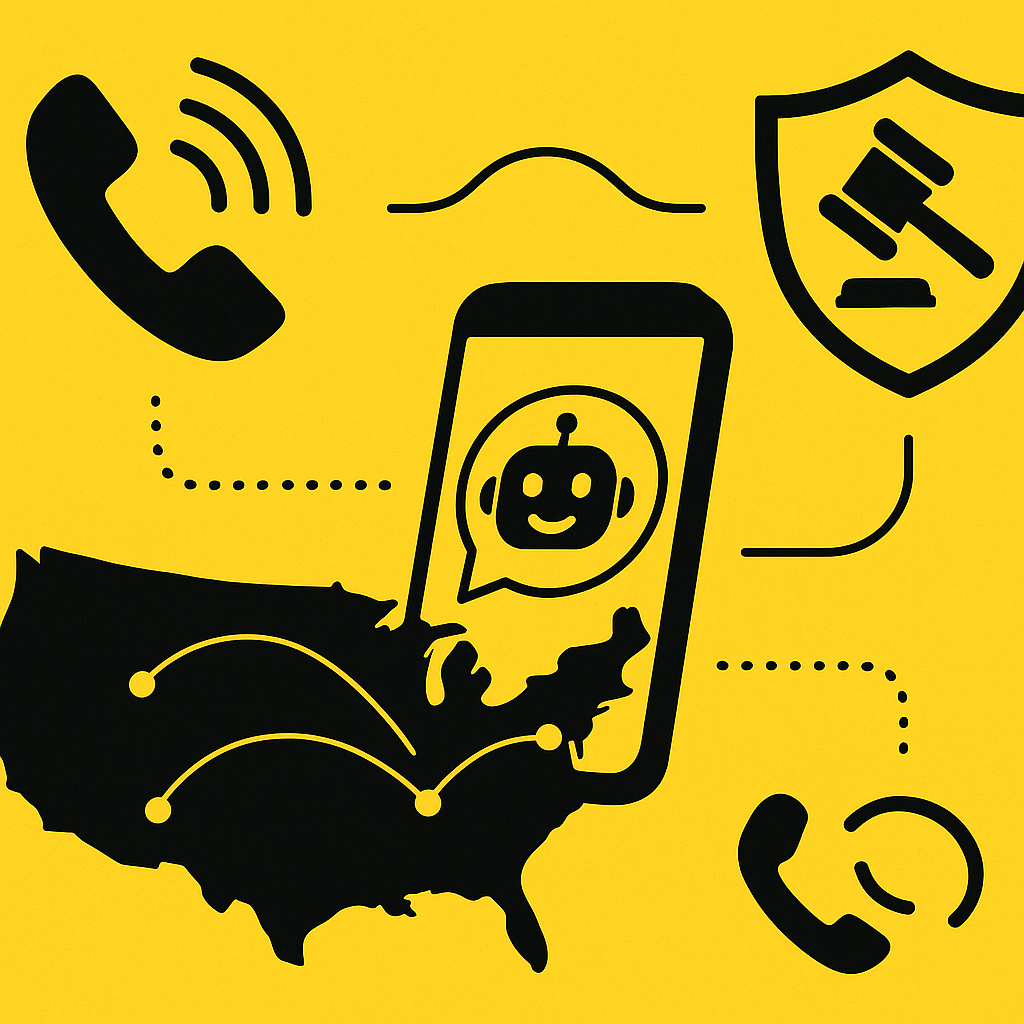
With California's AB 2905 taking effect on January 1, 2025, restaurants using AI virtual hosts face a new reality: $500 fines per non-disclosed AI call. (Blank Rome) This landmark legislation has sent ripples through the restaurant industry, where AI phone systems are experiencing "unbelievable, crazy growth" according to industry experts. (Hostie)
The stakes couldn't be higher. In-demand establishments receive between 800 and 1,000 calls per month, and many are turning to AI solutions to handle this volume efficiently. (Hostie) But with varying state laws on call recording and AI disclosure, restaurant operators need a clear roadmap to stay compliant while leveraging these powerful tools.
This comprehensive guide maps every one-party and all-party consent state, highlights new disclosure requirements, and provides practical implementation strategies—including sample pre-call scripts you can deploy in your IVR system today.
AI voice technology has revolutionized how restaurants handle customer communications. Voice ordering AI garnered significant attention at the National Restaurant Association's annual food show, signaling widespread industry adoption. (Hostie) Companies like Hostie AI, which launched primarily in the Bay Area in 2024, are now serving high-end establishments with around-the-clock AI phone hosts. (Hostie)
The technology addresses a critical pain point: "The phones would ring constantly throughout service," explains one restaurant operator. "We would receive calls for basic questions that can be found on our website." (Hostie) With labor costs rising—"At $17 per hour, you can hardly pay for your gas to get to the job"—AI solutions offer both cost savings and improved customer service. (Hostie)
The market has responded enthusiastically. ConverseNow, a leading voice AI platform, handles over 2,000,000 conversations per month and repurposes over 83,000 labor hours monthly. (ConverseNow) Meanwhile, RestoHost is now answering calls at 150 restaurants in the Atlanta metro area, demonstrating the technology's rapid geographic expansion. (Hostie)
Before diving into AI-specific requirements, it's crucial to understand the underlying call recording laws that govern all phone interactions. The United States operates under two primary consent frameworks:
In one-party consent states, only one person on the call needs to know about the recording. This means restaurants can record calls as long as they're aware of the recording—no customer notification required for basic call recording purposes.
All-party consent states require every participant to know about and agree to the recording. This creates more stringent requirements for restaurants operating in these jurisdictions.
The California Invasion of Privacy Act (CIPA), enacted in 1967, exemplifies all-party consent requirements and has recently been suggested to apply to internet-based communications, including VoIP calls and AI interactions. (Blank Rome) Violations can result in significant penalties, with individuals able to recover up to $5,000 per violation without proving actual damage. (Blank Rome)
| State | Key Requirements | AI Disclosure Notes |
|---|---|---|
| Alabama | One-party consent | Standard AI disclosure recommended |
| Alaska | One-party consent | Follow federal guidelines |
| Arizona | One-party consent | No additional AI requirements |
| Arkansas | One-party consent | Standard disclosure sufficient |
| Colorado | One-party consent | Consider local ordinances |
| Delaware | One-party consent | Standard AI disclosure |
| Georgia | One-party consent | No additional requirements |
| Hawaii | One-party consent | Standard disclosure recommended |
| Idaho | One-party consent | Follow federal guidelines |
| Indiana | One-party consent | No additional AI requirements |
| Iowa | One-party consent | Standard disclosure sufficient |
| Kansas | One-party consent | No additional requirements |
| Kentucky | One-party consent | Standard AI disclosure |
| Louisiana | One-party consent | Follow federal guidelines |
| Maine | One-party consent | Standard disclosure recommended |
| Minnesota | One-party consent | No additional requirements |
| Mississippi | One-party consent | Standard AI disclosure |
| Missouri | One-party consent | No additional requirements |
| Nebraska | One-party consent | Standard disclosure sufficient |
| New Jersey | One-party consent | Follow federal guidelines |
| New Mexico | One-party consent | No additional AI requirements |
| New York | One-party consent | Standard AI disclosure |
| North Carolina | One-party consent | No additional requirements |
| North Dakota | One-party consent | Standard disclosure recommended |
| Ohio | One-party consent | No additional requirements |
| Oklahoma | One-party consent | Standard AI disclosure |
| Oregon | One-party consent | Follow federal guidelines |
| Rhode Island | One-party consent | No additional requirements |
| South Carolina | One-party consent | Standard disclosure sufficient |
| South Dakota | One-party consent | No additional AI requirements |
| Tennessee | One-party consent | Standard AI disclosure |
| Texas | One-party consent | No additional requirements |
| Utah | One-party consent | Standard disclosure recommended |
| Vermont | One-party consent | Follow federal guidelines |
| Virginia | One-party consent | No additional requirements |
| West Virginia | One-party consent | Standard AI disclosure |
| Wisconsin | One-party consent | No additional requirements |
| Wyoming | One-party consent | Standard disclosure sufficient |
| State | Key Requirements | AI Disclosure Requirements |
|---|---|---|
| California | All-party consent + AB 2905 | MANDATORY AI disclosure or $500 fine per call |
| Connecticut | All-party consent | Enhanced AI disclosure recommended |
| Florida | All-party consent | Clear AI notification required |
| Illinois | All-party consent | Explicit AI disclosure needed |
| Maryland | All-party consent | Enhanced disclosure recommended |
| Massachusetts | All-party consent | Clear AI notification required |
| Michigan | All-party consent | Explicit AI disclosure needed |
| Montana | All-party consent | Enhanced disclosure recommended |
| Nevada | All-party consent | Clear AI notification required |
| New Hampshire | All-party consent | Explicit AI disclosure needed |
| Pennsylvania | All-party consent | Enhanced disclosure recommended |
| Washington | All-party consent | Clear AI notification required |
California's AB 2905 represents the most significant development in AI call compliance for 2025. The legislation specifically targets AI interactions and imposes strict disclosure requirements that go beyond traditional call recording laws.
This legislation builds on California's existing privacy framework, where CIPA violations can already be prosecuted as misdemeanors with jail time and fines. (Blank Rome)
"Thank you for calling [Restaurant Name]. This call may be recorded for quality and training purposes, and you'll be speaking with our AI assistant, Jasmine, who can help with reservations, menu questions, and general inquiries. If you need to speak with a human team member, please say 'transfer me' at any time. How can I help you today?"
"Thank you for calling [Restaurant Name]. You're speaking with our AI assistant, Jasmine, who can help with reservations, menu questions, and general inquiries. If you need to speak with a human team member, please say 'transfer me' at any time. How can I help you today?"
"Thank you for calling [Restaurant Name]. Before we begin, please note that this call may be recorded and you're speaking with an AI assistant. Our AI can handle most requests, but a human team member is always available if needed. Do you consent to continue with our AI assistant?"
Modern phone systems can automatically detect caller area codes and adjust disclosure scripts accordingly. This technology allows restaurants to:
Systems like FreePBX offer macro-dialout-trunk-predial-hook functionality that can evaluate caller patterns and apply appropriate routing rules. (TechNotes) Some operators even explore blocking entire area codes when necessary for compliance purposes. (FreePBX Community)
Advanced systems can automatically select appropriate CallerID numbers and compliance scripts based on geographic location. (Anveo) This ensures that restaurants maintain consistent compliance regardless of where calls originate.
Based on real-world implementation experience with restaurants like Burma Food Group, which "started with Hostie in 2025" and found success through careful compliance planning, here's a comprehensive checklist: (Hostie)
Successful AI implementations prioritize transparency. As one industry expert notes, the key is ensuring customers feel comfortable with the technology while maintaining operational efficiency. (Restaurant Business)
The best AI systems, like those offered by Hostie, provide seamless transitions to human staff when needed. This approach ensures compliance while maintaining customer satisfaction. (Hostie)
AI technology and regulations evolve rapidly. Successful restaurants establish regular review cycles to ensure ongoing compliance and optimal performance. (AppFront)
Many restaurants make the mistake of applying the same disclosure script across all states. This approach can lead to non-compliance in stricter jurisdictions like California.
Even with perfect technical implementation, staff must understand when and how to handle compliance issues. Regular training ensures everyone knows the procedures.
While state laws provide the framework, some cities and counties have additional requirements. Always check local regulations.
Compliance isn't just about following rules—it's about proving you followed them. Maintain comprehensive documentation of all compliance efforts.
With AI regulation evolving rapidly, restaurants must stay informed about new legislation. Consider subscribing to legal updates or working with specialized counsel.
As AI technology advances, compliance requirements may become more sophisticated. Plan for system upgrades that can accommodate new requirements.
Many restaurants benefit from industry associations that track compliance requirements and share best practices. Consider joining relevant trade organizations.
Despite compliance costs, AI phone systems deliver substantial value. According to industry data, AI can repurpose thousands of labor hours monthly while improving customer service quality. (ConverseNow) For restaurants receiving 800-1,000 calls monthly, the efficiency gains typically far outweigh compliance costs. (Hostie)
Navigating state-by-state call-recording compliance for AI virtual hosts requires careful planning, but the rewards are substantial. With California's AB 2905 setting a new standard and other states likely to follow, proactive compliance isn't just about avoiding fines—it's about building customer trust and operational excellence.
The restaurant industry's embrace of AI phone technology reflects a fundamental shift toward more efficient, cost-effective customer service. (AppFront) Companies like Burma Food Group have found success by partnering with compliant AI providers who understand both the technology and the regulatory landscape. (Hostie)
By implementing the strategies outlined in this guide—from state-specific disclosure scripts to automated area code detection—restaurants can harness the power of AI while maintaining full compliance. The key is treating compliance not as a burden, but as a foundation for sustainable growth and customer trust.
Remember: compliance requirements will continue evolving as AI technology advances. Stay informed, maintain flexibility in your systems, and don't hesitate to seek professional guidance when needed. The investment in proper compliance today protects your restaurant's future and ensures you can focus on what matters most—serving exceptional food and hospitality to your guests.
💡 Ready to see Hostie in action?
Don't miss another reservation or guest call.
👉 Book a demo with Hostie today
California's AB 2905, effective January 1, 2025, requires businesses using AI virtual hosts to disclose AI involvement in phone calls or face $500 fines per violation. This law specifically targets the growing use of AI phone systems in restaurants, where platforms like ConverseNow handle over 2 million conversations monthly. Restaurants must now implement proper disclosure protocols to avoid significant penalties under the California Invasion of Privacy Act.
Restaurants should implement clear, upfront disclosure scripts that inform callers they're speaking with an AI system before any conversation begins. The disclosure should be natural and conversational, such as "Hi, this is Jasmine, your AI assistant at [Restaurant Name]. I'm here to help with reservations and orders." This approach ensures compliance while maintaining a positive customer experience, as demonstrated by successful AI implementations like Hostie's multilingual AI system.
Eleven states require two-party consent for call recording, including California, Connecticut, Florida, Illinois, Maryland, Massachusetts, Montana, New Hampshire, Pennsylvania, and Washington. In these states, AI virtual hosts must obtain explicit consent from callers before recording conversations. This is particularly important as AI systems often record calls for training and quality assurance purposes.
Penalties vary significantly by state, with California's new law imposing $500 fines per undisclosed AI interaction. Under the California Invasion of Privacy Act, violations can result in civil penalties up to $5,000 per violation and potential misdemeanor charges with jail time. Other states have similar penalties ranging from hundreds to thousands of dollars per violation, making compliance essential for restaurants using AI phone systems.
AI virtual hosts like Hostie implement geo-location detection to automatically adjust disclosure requirements based on the caller's location. The system can configure different greeting scripts and consent protocols for one-party versus two-party consent states. This ensures restaurants operating across multiple locations remain compliant with varying state laws while maintaining consistent service quality through their multilingual AI capabilities.
Restaurants should implement clear AI disclosure at the beginning of calls, maintain detailed compliance documentation, and regularly update their systems to reflect changing state laws. They should also train staff on backup procedures when AI systems require human intervention and ensure their AI platform integrates properly with existing POS and reservation systems. Regular compliance audits and legal consultation are recommended given the evolving regulatory landscape.
RELATED


